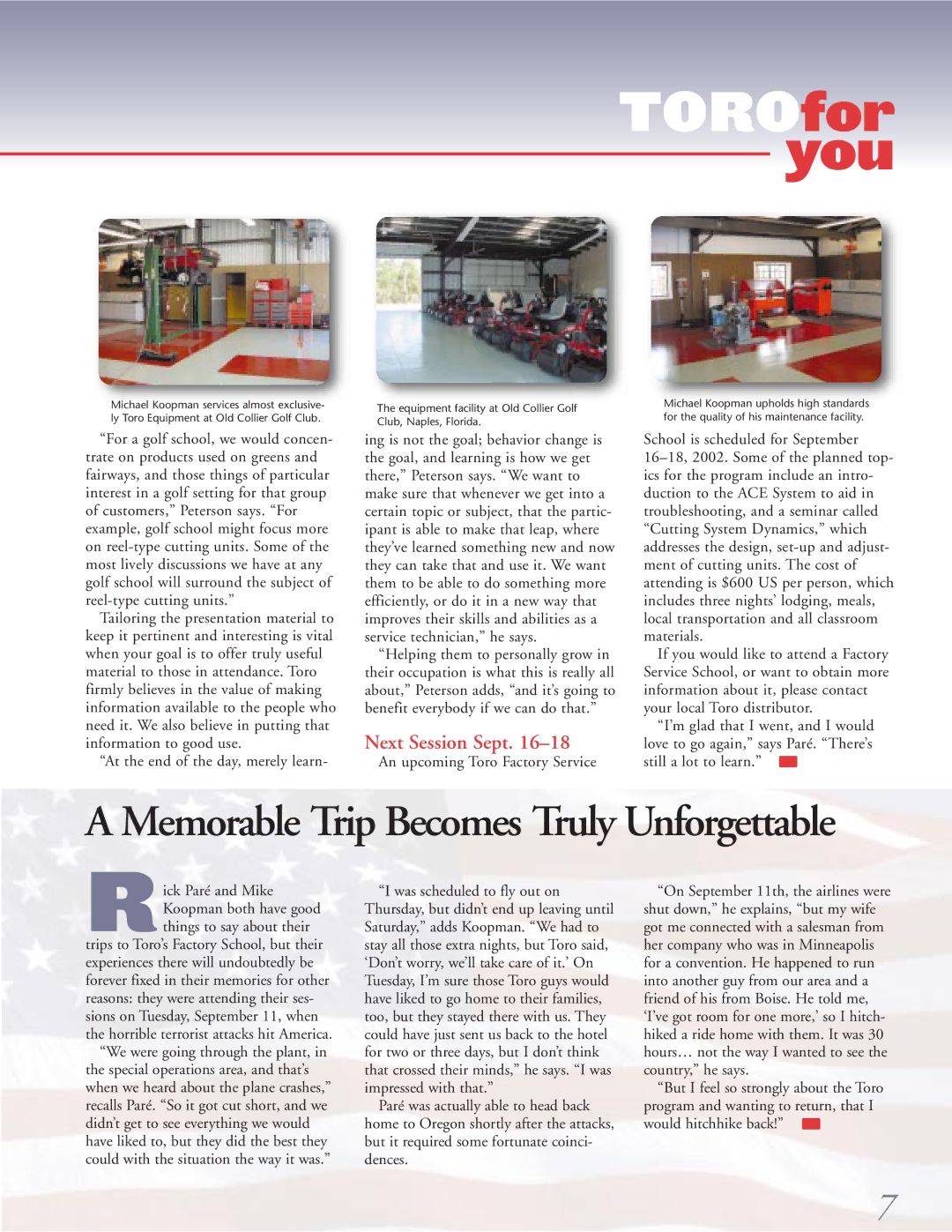
TOROfor
you
Michael Koopman services almost exclusive- ly Toro Equipment at Old Collier Golf Club.
The equipment facility at Old Collier Golf Club, Naples, Florida.
Michael Koopman upholds high standards for the quality of his maintenance facility.
“For a golf school, we would concen- trate on products used on greens and fairways, and those things of particular interest in a golf setting for that group of customers,” Peterson says. “For example, golf school might focus more on
Tailoring the presentation material to keep it pertinent and interesting is vital when your goal is to offer truly useful material to those in attendance. Toro firmly believes in the value of making information available to the people who need it. We also believe in putting that information to good use.
“At the end of the day, merely learn-
ing is not the goal; behavior change is the goal, and learning is how we get there,” Peterson says. “We want to make sure that whenever we get into a certain topic or subject, that the partic- ipant is able to make that leap, where they’ve learned something new and now they can take that and use it. We want them to be able to do something more efficiently, or do it in a new way that improves their skills and abilities as a service technician,” he says.
“Helping them to personally grow in their occupation is what this is really all about,” Peterson adds, “and it’s going to benefit everybody if we can do that.”
Next Session Sept. 16–18
An upcoming Toro Factory Service
School is scheduled for September
If you would like to attend a Factory Service School, or want to obtain more information about it, please contact your local Toro distributor.
“I’m glad that I went, and I would love to go again,” says Paré. “There’s still a lot to learn.” ![]()
A Memorable Trip Becomes Truly Unforgettable
Rick Paré and Mike Koopman both have good things to say about their
trips to Toro’s Factory School, but their experiences there will undoubtedly be forever fixed in their memories for other reasons: they were attending their ses- sions on Tuesday, September 11, when the horrible terrorist attacks hit America.
“We were going through the plant, in the special operations area, and that’s when we heard about the plane crashes,” recalls Paré. “So it got cut short, and we didn’t get to see everything we would have liked to, but they did the best they could with the situation the way it was.”
“I was scheduled to fly out on Thursday, but didn’t end up leaving until Saturday,” adds Koopman. “We had to stay all those extra nights, but Toro said, ‘Don’t worry, we’ll take care of it.’ On Tuesday, I’m sure those Toro guys would have liked to go home to their families, too, but they stayed there with us. They could have just sent us back to the hotel for two or three days, but I don’t think that crossed their minds,” he says. “I was impressed with that.”
Paré was actually able to head back home to Oregon shortly after the attacks, but it required some fortunate coinci- dences.
“On September 11th, the airlines were shut down,” he explains, “but my wife got me connected with a salesman from her company who was in Minneapolis for a convention. He happened to run into another guy from our area and a friend of his from Boise. He told me, ‘I’ve got room for one more,’ so I hitch- hiked a ride home with them. It was 30 hours… not the way I wanted to see the country,” he says.
“But I feel so strongly about the Toro program and wanting to return, that I would hitchhike back!” ![]()
7
